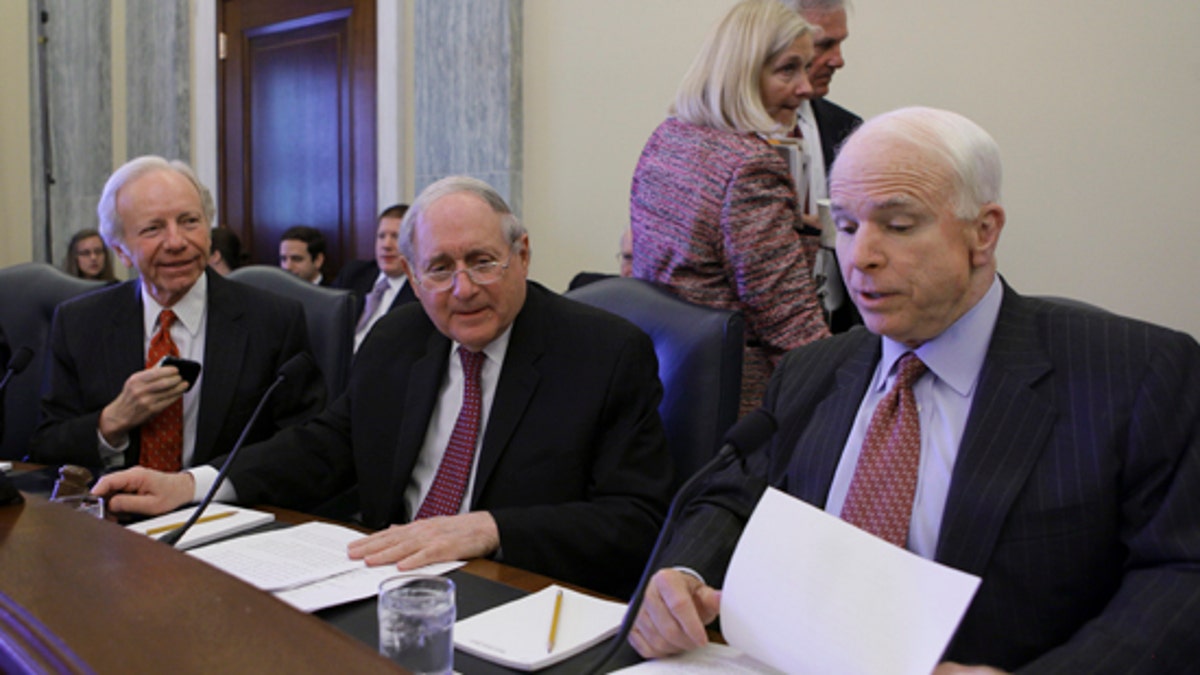
Senate Armed Services Committee Sen. Carl Levin, D-Mich., center, flanked by the committee's ranking Republican Sen. John McCain, R-Ariz., right, and Sen. Joseph Lieberman, I-Conn., prepares to open the committee's hearing on U.S. policy toward Iran's nuclear program, Wednesday, April 14, 2010. (AP)
As Iran gets closer to fulfilling its nuclear ambitions, Republican lawmakers are pushing the Obama administration to stop whistling past the graveyard and get tough with the Islamic Republic.
Sen. John McCain said Wednesday the United States has been backing away from a brewing fight with Iran, while U.S. officials admitted that that country's accelerated nuclear program is roughly a year away from producing a weapon.
McCain opened a Senate hearing Wednesday by saying that Iran will get the bomb unless the U.S. acts more boldly. The Arizona Republican said the U.S. keeps pointing a loaded gun at Iran, but it is failing to "pull the trigger."
The U.S. government has prepared a new, classified assessment of Iran's nuclear capability and intent, but it has not released it yet. Military and intelligence officials who testified before Congress Wednesday would not publicly address whether the U.S. has changed its 4-year-old assessment that Iran isn't actively seeking to make a bomb.
Gen. James Cartwright, vice chairman of the Joint Chiefs of Staff, told the Senate Armed Services Committee that Iran could have a deliverable nuclear weapon in three to five years, going a step further than Defense Secretary Gates, who told reporters Tuesday that Iran could make a nuclear weapon within a year.
Iran maintains it does not plan to build a nuclear weapon and that its nuclear fuel enrichment is for power production only.
Cartwright, the nation's second highest-ranking military officer, said that historically, it takes a country three to five years to make a deliverable bomb from this point. But the timeline he cited could be shortened if Iran pursues ways to deliver a weapon at the same time it works on building one.
Republican pressure on the Obama administration to act more aggressively against Iran comes in the same week that the president held a 47-nation summit to focus attention on the threat of nuclear terrorism. Iran was not invited to attend the session.
In a news conference at the end of the summit, Obama said he was confident China would join other nations in pressing for tough new sanctions on Iran for continuing to defy the international community in seeking such weapons.
"Words have to mean something. There have to be some consequences," Obama said.
But Arizona Sen. Jon Kyl, a Republican critic of Obama's nuclear policies, said the conference was a disappointment.
"The summit's purported accomplishment is a nonbinding communique that largely restates current policy and makes no meaningful progress in dealing with nuclear terrorism threats or the ticking clock represented by Iran's nuclear weapons program," Kyl said.
For its part, Iran has not backed down from a confrontation with the U.S. President Mahmoud Ahmadinejad mocked Obama's new nuclear strategy last week, dismissing it as a "cowboy" policy by a political newcomer that is doomed to fail.
Obama's new strategy includes a vow not to use nuclear weapons against countries that do not have them. Iran and North Korea were pointedly excepted from that pledge because Washington accuses them of not cooperating with the international community on nonproliferation standards.
"American materialist politicians, whenever they are beaten by logic, immediately resort to their weapons like cowboys," Ahmadinejad said in a speech before a crowd of several thousand in Iran last week.
"Mr. Obama, you are a newcomer. Wait until your sweat dries and get some experience. Be careful not to read just any paper put in front of you or repeat any statement recommended," Ahmadinejad said in the speech, aired live on state TV.
He said Obama "is under the pressure of capitalists and the Zionists," and he vowed Iran will not be pushed around.
"(American officials) bigger than you, more bullying than you, couldn't do a damn thing, let alone you," he said, addressing Obama.
On Wednesday, Bill Burns, the No. 3 person at the State Department, said the United States is working as fast as it can to win new international sanctions on Iran.
Burns predicted that a resolution will emerge from the United Nations Security Council this spring, and he called the case for new penalties urgent, saying he expects China will agree to some form of sanctions.
The Associated Press contributed to this report.




